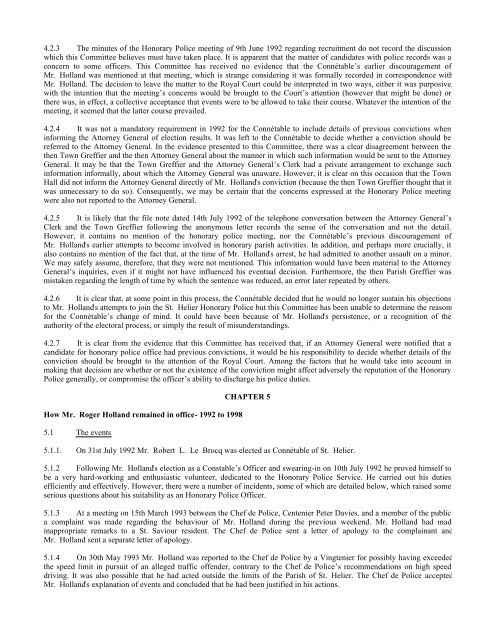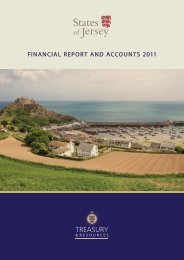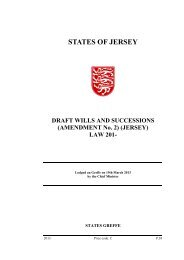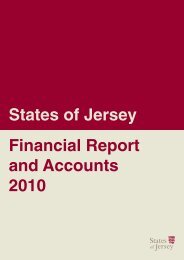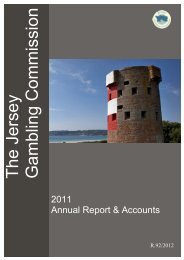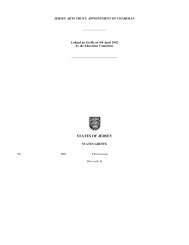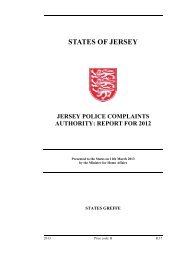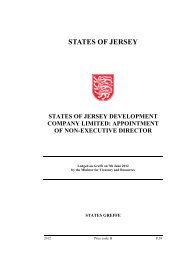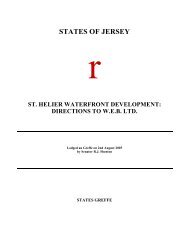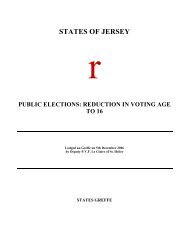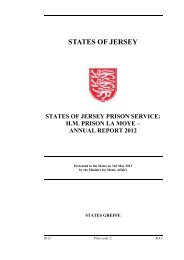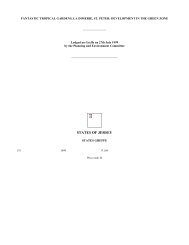report - States Assembly
report - States Assembly
report - States Assembly
- No tags were found...
Create successful ePaper yourself
Turn your PDF publications into a flip-book with our unique Google optimized e-Paper software.
4.2.3 The minutes of the Honorary Police meeting of 9th June 1992 regarding recruitment do not record the discussionwhich this Committee believes must have taken place. It is apparent that the matter of candidates with police records was aconcern to some officers. This Committee has received no evidence that the Connétable’s earlier discouragement ofMr. Holland was mentioned at that meeting, which is strange considering it was formally recorded in correspondence withMr. Holland. The decision to leave the matter to the Royal Court could be interpreted in two ways, either it was purposive,with the intention that the meeting’s concerns would be brought to the Court’s attention (however that might be done) orthere was, in effect, a collective acceptance that events were to be allowed to take their course. Whatever the intention of themeeting, it seemed that the latter course prevailed.4.2.4 It was not a mandatory requirement in 1992 for the Connétable to include details of previous convictions wheninforming the Attorney General of election results. It was left to the Connétable to decide whether a conviction should bereferred to the Attorney General. In the evidence presented to this Committee, there was a clear disagreement between thethen Town Greffier and the then Attorney General about the manner in which such information would be sent to the AttorneyGeneral. It may be that the Town Greffier and the Attorney General’s Clerk had a private arrangement to exchange suchinformation informally, about which the Attorney General was unaware. However, it is clear on this occasion that the TownHall did not inform the Attorney General directly of Mr. Holland’s conviction (because the then Town Greffier thought that itwas unnecessary to do so). Consequently, we may be certain that the concerns expressed at the Honorary Police meetingwere also not <strong>report</strong>ed to the Attorney General.4.2.5 It is likely that the file note dated 14th July 1992 of the telephone conversation between the Attorney General’sClerk and the Town Greffier following the anonymous letter records the sense of the conversation and not the detail.However, it contains no mention of the honorary police meeting, nor the Connétable’s previous discouragement ofMr. Holland’s earlier attempts to become involved in honorary parish activities. In addition, and perhaps more crucially, italso contains no mention of the fact that, at the time of Mr. Holland’s arrest, he had admitted to another assault on a minor.We may safely assume, therefore, that they were not mentioned. This information would have been material to the AttorneyGeneral’s inquiries, even if it might not have influenced his eventual decision. Furthermore, the then Parish Greffier wasmistaken regarding the length of time by which the sentence was reduced, an error later repeated by others.4.2.6 It is clear that, at some point in this process, the Connétable decided that he would no longer sustain his objectionsto Mr. Holland’s attempts to join the St. Helier Honorary Police but this Committee has been unable to determine the reasonsfor the Connétable’s change of mind. It could have been because of Mr. Holland’s persistence, or a recognition of theauthority of the electoral process, or simply the result of misunderstandings.4.2.7 It is clear from the evidence that this Committee has received that, if an Attorney General were notified that acandidate for honorary police office had previous convictions, it would be his responsibility to decide whether details of theconviction should be brought to the attention of the Royal Court. Among the factors that he would take into account inmaking that decision are whether or not the existence of the conviction might affect adversely the reputation of the HonoraryPolice generally, or compromise the officer’s ability to discharge his police duties.How Mr. Roger Holland remained in office- 1992 to 19985.1 The eventsCHAPTER 55.1.1. On 31st July 1992 Mr. Robert L. Le Brocq was elected as Connétable of St. Helier.5.1.2 Following Mr. Holland’s election as a Constable’s Officer and swearing-in on 10th July 1992 he proved himself tobe a very hard-working and enthusiastic volunteer, dedicated to the Honorary Police Service. He carried out his dutiesefficiently and effectively. However, there were a number of incidents, some of which are detailed below, which raised someserious questions about his suitability as an Honorary Police Officer.5.1.3 At a meeting on 15th March 1993 between the Chef de Police, Centenier Peter Davies, and a member of the publica complaint was made regarding the behaviour of Mr. Holland during the previous weekend. Mr. Holland had madeinappropriate remarks to a St. Saviour resident. The Chef de Police sent a letter of apology to the complainant andMr. Holland sent a separate letter of apology.5.1.4 On 30th May 1993 Mr. Holland was <strong>report</strong>ed to the Chef de Police by a Vingtenier for possibly having exceededthe speed limit in pursuit of an alleged traffic offender, contrary to the Chef de Police’s recommendations on high speeddriving. It was also possible that he had acted outside the limits of the Parish of St. Helier. The Chef de Police acceptedMr. Holland’s explanation of events and concluded that he had been justified in his actions.


